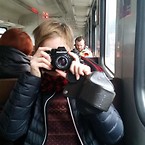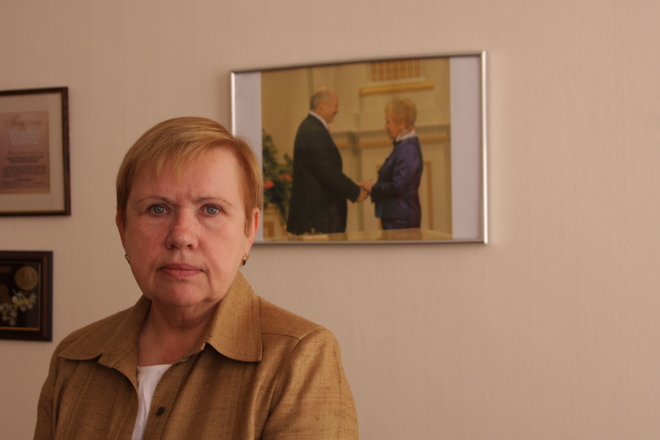For 20 years Lidia Yermoshina has been the head of the Central Election Commission in Belarus. She is responsible for the massive election manipulation reported by the OSCE, the international community and Belarusian citizens. She is a celebrity in the national media for her dubious statements on the role of women in society. Aksana Rudovich and me met her for an interview.
Belarus Votes: Today is the fourth day of early voting and we have already heard about many violations from election observers.
Lidia Yermoshina: There are not many violations. The observers make artificial conclusions from artificial situations, they understand the law in their own way. For example, observers claim that a portrait of a candidate can not be hung on the door of the polling station, while the law does not prohibit it. Or observers believe that they should be allowed to stay in the the same room as the ballot box stays during the break.
In particular, there were complaints about so-called "carousels", multiple voting by the same person. There are photos of the same people at different polling stations.
Maybe, they went there on purpose, in order to be provocative. On the internet people can write whatever they want. We don't have "carousels". People have to show their passports in order to vote, that's why it is impossible. We might have imprecise lists of voters, it might happen that a voter is not included in the list. But it is impossible that someone is included in the list twice.
Observers from one polling station claim that they counted 30 voters while at the end of the day the official number was 108.
The only proof of participation in the elections are the data from the election commission. That is why all other claims are not based on the law.
Do you believe that the observers lied on purpose?
Absolutely.
During the presidential elections in 2015, in the Novopolotsk and Pruzhany regions there were no spoiled ballot papers at all, while in 2010 they spoiled around 200 ballot papers. How can this be possible if we take probability theory into account?
So what? In 2010 there were more candidates, maybe that was the reason.
Why do the election commissions consider complaints about themselves? The judge and the defendant is therefore the same person.
And why not? They are not governmental officials. Members of the election commissions are civic activists, the same as observers. When an observer complains, we send his complaint to the election commission at a higher level, and they ask the head of the local election commission for an explanation. Then they decide whether the complaint was reasonable.
Do you consider it as pressure when a company director or university dean calls for participation in early voting?
No, as long as they do not force their workers or students to do so. If they only invite them, this is just agitation, which is allowed for every citizen.
Why there are so few opposition representatives opposition in the election commissions? One of the OSCE recommendations was to include them.
It's not required by the law to include them. We employ people who are well-known and respected within society. We consider recommendations of their colleagues and neighbours.
You mentioned once that women account for 54 percent of the population, and should be represented in the parliament proportionately. Do we need a law on the quota for women?
We cannot introduce such a quota as we have a majoritarian voting system. Unless we change to another system, like proportional, we can not fulfill it. Anyway, I hope that women will play a more active part in the elections, even within the existing system.
If so, why do you discourage women from doing so while stating in interviews that their place is not in politics?
I did not say that, probably you are biased. Women can do whatever they want, if it fits with their philosophy. In Belarus women are mostly not interested in politics, this is how it is. To become a member of the national parliament you have to change your place of residence, to move your family and kids. Women do not go for that by choice.
... FOR FULL TEXT AND VIDEO PLEASE FOLLOW THE LINK
Lidia Mikhailovna Yermoshina was born 1953 in Slutsk, 105 kilometres south of Minsk. She graduated from the Faculty of Law in Kaliningrad, now Russia. In Wikipedia she is described as a "politician", but she calls herself a "civil servant". Until February 2016 she was banned from entering the European Union due to widespread fraud in all the elections she had overseen.
Photo: Lidia Yermoshina in her office in Minsk, in the back a photo with president Lukashenko. © Nancy Waldmann


